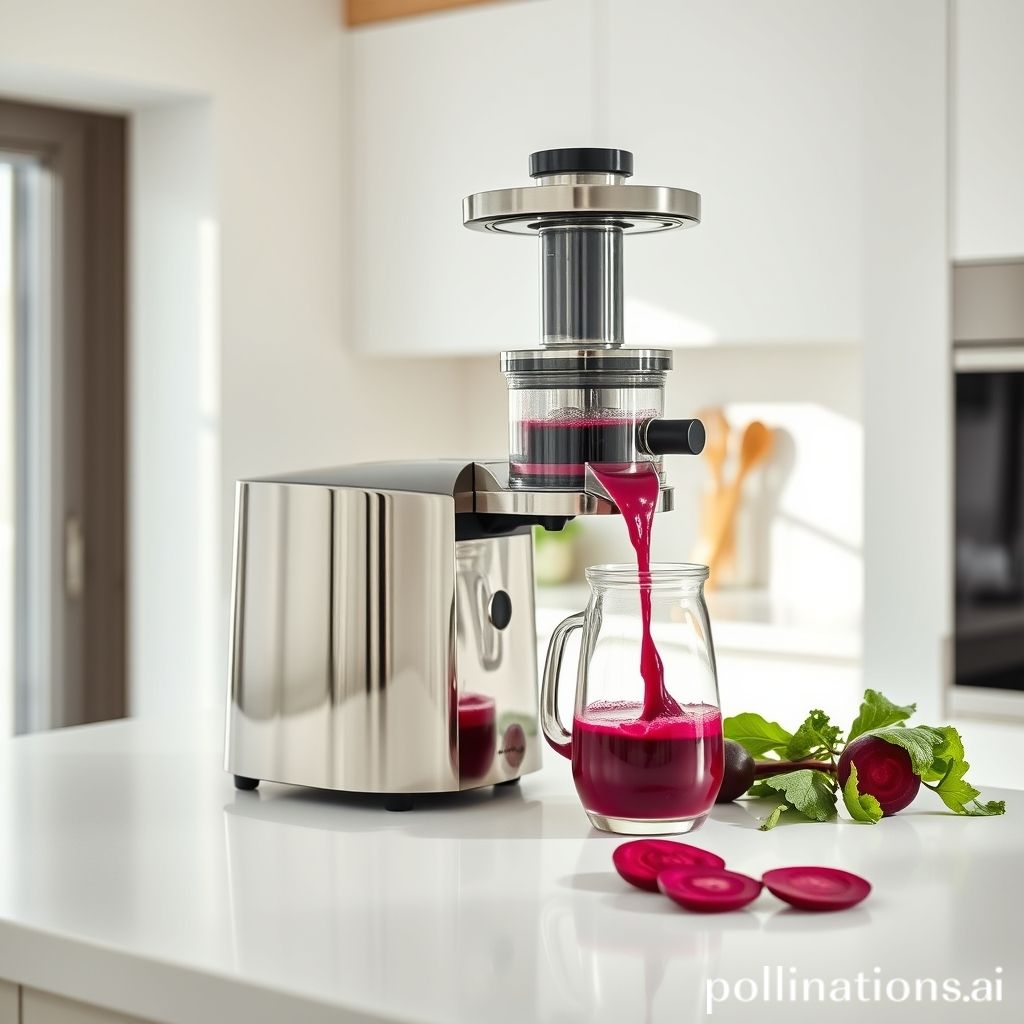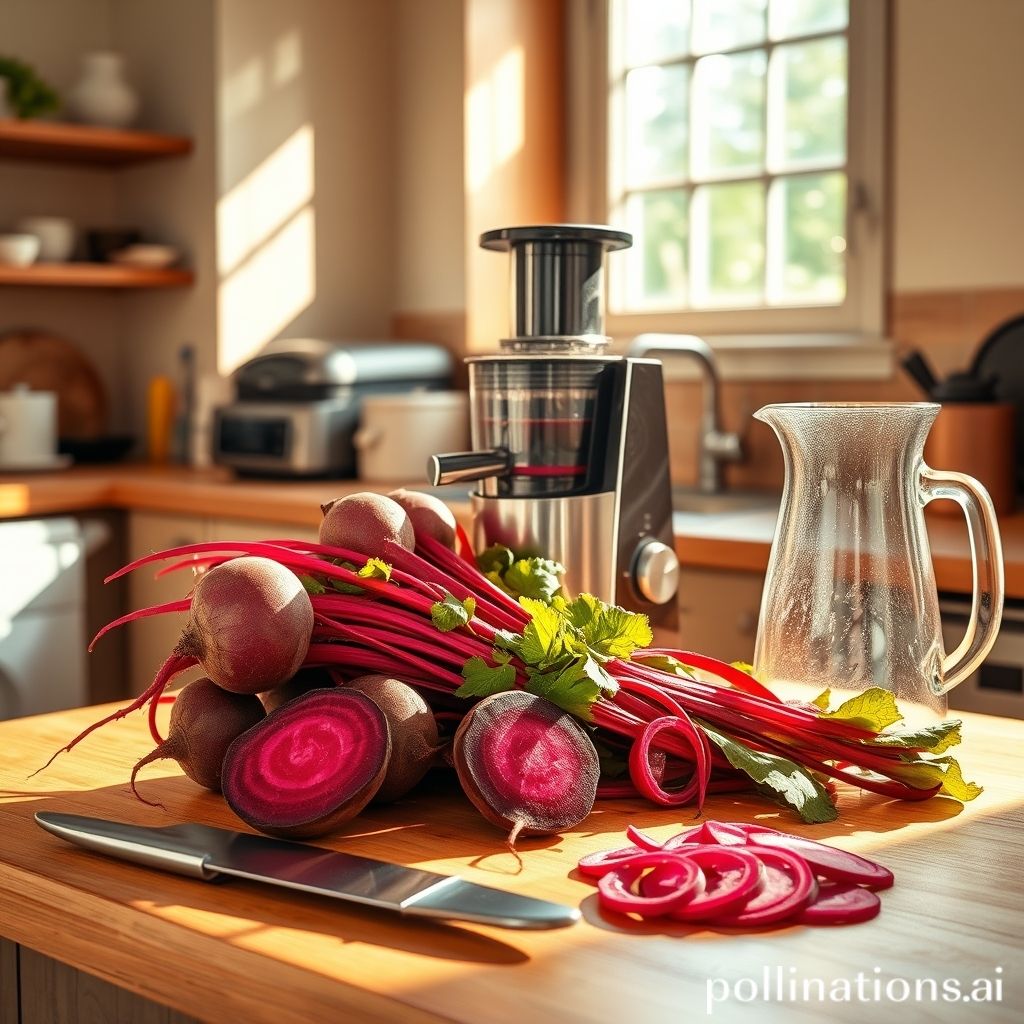Can You Juice The Skin Of Beets?
Beets are a vibrant and nutritious root vegetable that can be enjoyed in a variety of ways. Many people wonder if it is possible to juice the skin of beets, and if there are any advantages or disadvantages to doing so.
This article aims to answer these questions and provide you with all the information you need to make an informed decision. Whether you are a beet enthusiast or simply curious about juicing, read on to discover the potential benefits and drawbacks of juicing the skin of beets. Additionally, we will provide some useful tips and recommendations for incorporating beets into your juicing routine.

Table of Contents
Benefits of Juicing Beets
1. High Nutrient Content
Juicing beets, including the skin, can provide a wealth of nutrients. Beets are rich in vitamins and minerals such as vitamin C, folate, potassium, and manganese. These nutrients are essential for supporting overall health and well-being.
For example, vitamin C is a powerful antioxidant that boosts immunity and protects cells from damage. Folate is important for cell growth and development, At the same time potassium contributes to proper heart and muscle function. Manganese supports bone health and metabolism.
2. Improved Exercise Performance
Incorporating beet juice, including the skin, into your pre-workout routine can enhance exercise performance. Beets contain nitrates, which are converted into nitric oxide in the body. Nitric oxide helps dilate blood vessels, improving blood flow and oxygen delivery to the muscles.
Studies have shown that consuming beet juice can increase stamina, reduce fatigue, and improve endurance during physical activities. This can be particularly beneficial for athletes or individuals engaging in intense exercise routines.
3. Lower Blood Pressure
Drinking beet juice, with or without the skin, may help lower blood pressure levels. Beets are a natural source of nitrates, which have a positive impact on blood pressure.
When consumed, the nitrates in beets are converted to nitric oxide, which relaxes and widens blood vessels, promoting better blood flow and reducing pressure on the arterial walls. This effect can potentially help manage hypertension and improve overall cardiovascular health.
It’s important to note that At the same time beets can be beneficial for blood pressure management, individuals with existing medical conditions or those taking medication should consult their healthcare provider before making significant dietary changes.
Expert Tips: Boost your health with juiced beets. They’re packed with nutrients, enhance exercise performance, and can lower blood pressure.Can you juice the skin of beets?
1. Feasibility of juicing beet skin
Many people wonder if they can juice the skin of beets. The answer is yes, you can juice the skin of beets. The skin is edible and contains nutrients that are beneficial to your health.
Before juicing the beet skin, it is important to wash and scrub the beets thoroughly to remove any dirt or residue. This ensures that you are consuming a clean and safe product.
It is also recommended to choose organic beets whenever possible to minimize exposure to pesticides and other harmful chemicals.
2. Nutritional value of beet skin
The skin of beets contains a significant amount of nutrients that contribute to your overall health and well-being. It is rich in fiber, which aids in digestion and promotes a healthy gut.
Beet skin also contains antioxidants, such as betalains, which have anti-inflammatory and detoxifying properties. These antioxidants protect your cells from damage and reduce the risk of chronic diseases.
Furthermore, the skin of beets is a good source of vitamins and minerals, including vitamin A, vitamin C, potassium, and iron.
| Nutrient | Amount per 100g |
|---|---|
| Fiber | 2.8g |
| Vitamin A | 33µg |
| Vitamin C | 4.9mg |
| Potassium | 325mg |
| Iron | 0.8mg |
By juicing the beet skin, you can maximize the nutritional benefits of this vegetable and add a unique flavor to your juice.
That being said, it is important to note that the skin of beets can have a slightly bitter taste. If you prefer a sweeter juice, you may choose to remove the skin before juicing.
Potential Benefits of Juicing Beet Skin
1. Increased Fiber Intake
Adding the skin of beets to your juice can increase your fiber intake. The skin contains a significant amount of dietary fiber, which promotes a healthy digestive system. Fiber helps prevent constipation and supports overall gut health.
2. Enhanced Antioxidant Content
Beet skin is packed with antioxidants that protect your cells from damage caused by free radicals. These antioxidants, such as betalains and polyphenols, have been linked to various health benefits, including reduced inflammation, improved heart health, and boosted immune function.
By including the skin in your juice, you can maximize your intake of these beneficial antioxidants. This provides an added boost of protection against oxidative stress and contributes to overall well-being.
Incorporating beet skin into your juice is a simple and convenient way to enjoy the potential benefits of these antioxidants.
Conclusion
Juicing the skin of beets offers potential benefits, including increased fiber intake and enhanced antioxidant content. Adding the skin to your beet juice provides additional nutrients and contributes to a healthier diet. Remember to thoroughly wash the beet skin before juicing to remove any dirt or pesticides.
It is important to practice moderation when juicing. At the same time beet skin is a nutritious addition to your juice, it is also essential to include a variety of fruits and vegetables in your diet for a well-rounded nutrient intake.
| Benefits | Description |
|---|---|
| Increased Fiber Intake | Beet skin is a good source of dietary fiber, promoting a healthy digestive system and regular bowel movements. |
| Enhanced Antioxidant Content | Beet skin is rich in antioxidants like betalains and polyphenols, which protect against cell damage and offer various health benefits. |

Drawbacks of Juicing Beet Skin
1. Bitter Taste
When juicing beets, the skin can add a bitter taste to the juice. This is because the skin contains compounds that contribute to a stronger and slightly unpleasant flavor. To achieve a sweeter and milder taste, it is recommended to remove the skin before juicing.
2. Potential Pesticide Residue
Another concern when juicing beet skin is the possible presence of pesticide residue. Like other fruits and vegetables, beets may undergo pesticide treatment during the growing process. Although washing the skin can help reduce pesticide residue, it may not completely eliminate it. If you are worried about pesticide exposure, it is advisable to peel the beets and discard the skin before juicing.
It is important to note that the mentioned drawbacks may vary depending on the source and quality of the beets. Organic beets are generally grown without synthetic pesticides, which reduces the risk of pesticide residue. Although, it is always a good practice to thoroughly wash and peel beets to minimize potential risks.
| Drawbacks of Juicing Beet Skin |
|---|
| Bitter Taste |
| Potential Pesticide Residue |
Tips for Juicing Beet Skin
1. Thoroughly wash the beet
Before juicing the skin of beets, it is important to wash them thoroughly. Beets are root vegetables that grow in the ground, and their skin can contain dirt, pesticides, or other contaminants. By washing the beet skin, you can remove any potential debris and reduce the risk of consuming harmful substances.
2. Consider using organic beets
When juicing beet skin, it is recommended to use organic beets whenever possible. Conventionally grown beets may be treated with synthetic pesticides, which can accumulate in the skin. By choosing organic beets, you can minimize your exposure to these chemicals and enjoy the natural flavors and nutrients of the beet skin.
3. Try out different recipes
Juicing the skin of beets opens up a world of possibilities for creating unique and nutritious juice recipes. The beet skin adds a vibrant color and earthy taste to the juice, which can be enhanced with various fruits and vegetables. Consider trying out different combinations such as beet skin with apple and ginger or beet skin with carrot and lemon to discover your favorite flavor profiles.
Conclusion
Juicing the skin of beets is entirely possible and can offer several benefits. The skin contains a high concentration of nutrients, including fiber, antioxidants, and vitamins.
By juicing the skin, you can maximize the nutritional value of your beet juice. Notwithstanding, it is important to thoroughly wash and scrub the beet skin before juicing to remove any potential contaminants. Additionally, some people may find the taste of the skin slightly bitter, so you can choose to peel the beets if desired. Overall, incorporating the beet skin into your juicing routine can be a simple and effective way to enhance the health benefits of this vibrant vegetable.
Faq about Juicing Beet Skin
FAQ 1: Can beet skin cause digestive issues?
No, beet skin does not typically cause digestive issues. In fact, beet skin contains fiber, which can aid in digestion and promote bowel regularity.
FAQ 2: Does juicing beet skin affect the texture of the juice?
Yes, juicing beet skin can affect the texture of the juice. The skin may add a slightly thicker consistency to the juice, but it can be easily blended with the rest of the ingredients for a smooth texture.
FAQ 3: How should I store beet juice with the skin?
To store beet juice with the skin, it is recommended to transfer the juice into an airtight container and refrigerate it. This will help maintain its freshness and prevent any spoilage. Consume the juice within 2-3 days for the best taste and nutritional value.
FAQ 4: Can I juice the leaves of beets as well?
Yes, the leaves of beets, also known as beet greens, can be juiced along with the beetroot itself. Beet greens are rich in nutrients and can add a slightly earthy flavor to the juice. Ensure that the leaves are fresh and thoroughly washed before juicing.
FAQ 5: Are there any safety concerns with juicing beet skin?
There are generally no safety concerns with juicing beet skin. Although, it is important to use organic beets or thoroughly wash conventionally grown beets to remove any dirt or pesticides from the skin. Additionally, individuals with specific allergies or sensitivities should consult with their healthcare provider before consuming beet juice with the skin.
Read Similar Post:
1. Is It Beneficial to Combine Carrot, Cucumber, and Beetroot in Your Diet?
2. Maximizing Beet Leaf Freshness: Expert Tips for Storage and Preservation

